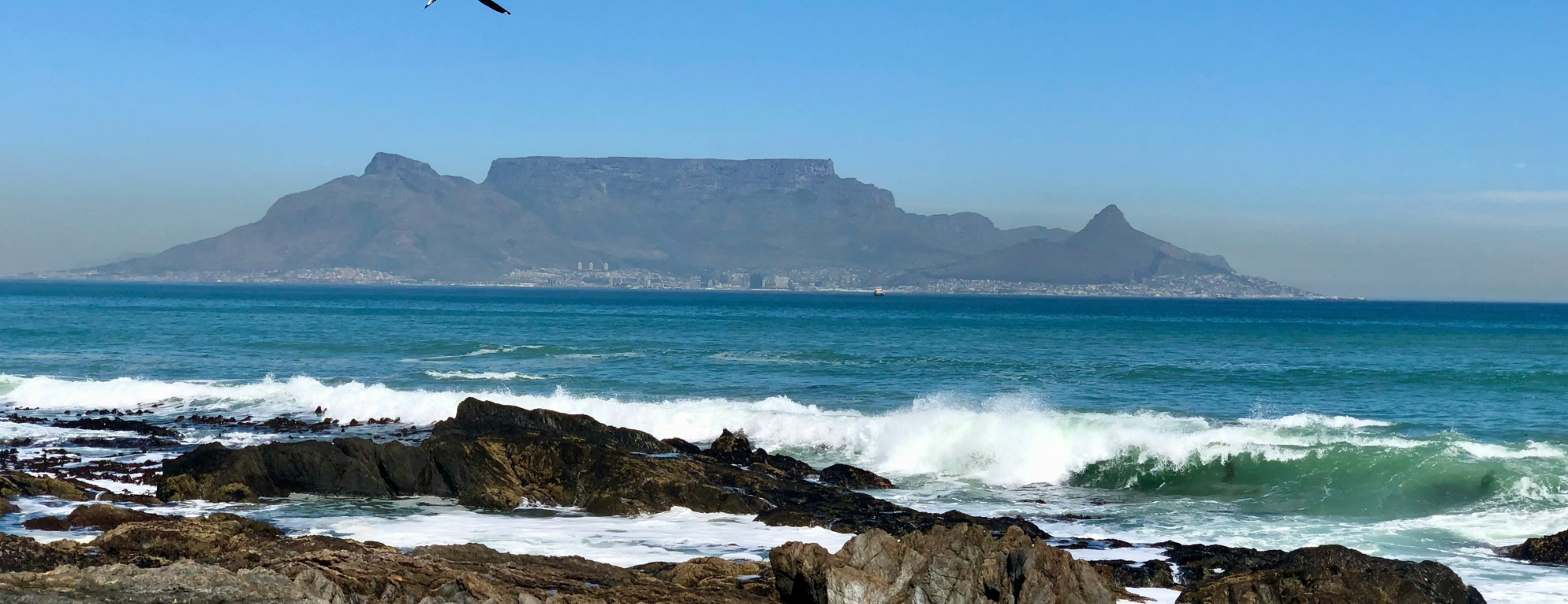
Aphiwe Moshani, Blue Food Futures Fellow
I’ve long been drawn towards understanding historical injustices that have affected coastal livelihoods on the biodiverse African coast. With my family’s roots in the Eastern Cape, South Africa, I grew up in a small town in Gauteng, known as the passionate and outspoken youngest of five, always observing and learning from my surroundings and never without a question forming in my mouth. As I got older, academia became a place where I could ask questions and have the space and resources to search for answers.
I’d always been inquisitive about events occurring around me, so during my bachelor’s studies at the University of Johannesburg, I was following the rise of the sustainability movement in South Africa. The country’s adoption of the term “sustainable development” was unfolding in ways that intrigued me as a young millennial in the geographical and environmental science space. With a coastline that is home to more than 13,000 marine species spanning over 3000 kilometers, South Africa was championing nature-based economic solutions like ecotourism and conservation as ways to promote economic development while protecting the environment in what would be a global Blue Economy mandate.
My own research, spanning from 1800 to contemporary ocean governance, gave me a deeper historical and justice-oriented perspective. While South Africa boasts as having one of the most rich and biodiverse oceans and coasts in the world, the country is riddled with deep inequality with a long history of colonialism and racial segregation, with black and non-white communities being displaced from their coastal lands and placed onto often undesirable land in townships and homelands*. In fact, the country’s first state-led conservation movements were themselves a colonial project, introduced by colonists as a type of quasi-preservation and spatial ordering exercise. These previously occupied coastal areas were now being “conserved” with the creation of nature reserves and protected areas, ignoring the fact that non-white communities had been caring for the land and the ocean for centuries prior.
Naturally, I had questions about what this new wave of conservation meant in the context of a South African experience, with generations of South Africans being influenced by a historical separation from nature. Specifically, I was keen to know what ocean justice, redress, restitution, and equity would look like in post-apartheid planning. But when I would engage in these conversations, both casually among my social circles and academically in undergraduate spaces, none of my questions were being addressed with the necessary depth.
When South Africa’s post-COVID economic focus shifted towards the ocean, with talk of an “Oceans Economy Master Plan,” I started my PhD researching the conflicts emerging from economic development, social justice, and environmental objectives via expanding ocean-based industries, such as marine transport and manufacturing, offshore oil and gas exploration, aquaculture, coastal and marine tourism, and fisheries.
I believe that research matters most when it leads to real changes in people’s everyday lives. That requires researchers to move beyond the ivory towers of their institutions. While my passion for learning led me to academia, my intellectual curiosity has always remained rooted in local communities and their livelihoods. In particular, I’m interested in how they can impact, and are impacted by, high-level decisions such as those driving a new ocean economy. Yet in countries across the African continent, less than 0.5% of governmental budgets go to ocean science research, which means there is a lot we don’t know about the future of the ocean, ocean governance, the blue economy, trade-offs, and the local impacts of certain policies.
Knowledge creation can’t be limited to academic research alone. We have to start recognizing indigenous knowledge systems, not as “trendy” topics, but as true sciences and legitimate ways of knowing that are essential to policy. Within my own career, I hope to see a shift from merely acknowledging indigenous and local knowledge to holding real space for these communities to imagine more inclusive, thriving futures.
When I learned about the Blue Food Futures fellowship, I was drawn to its collaborative support that is fundamental for an early career researcher like myself, who is hoping to see more local inclusion in the research community and is motivated by creative solutions. The program itself is not only committed to bridging science and policy, but centers on community-level work, creating opportunities for communities to engage in evidence-based research and create place-based solutions.
Recently, I’ve been inspired by the brilliance and innovation of young Africans, emerging as thought leaders, artists, and musicians who go against the grain and believe in themselves, their knowledge, capabilities, and their craft. Despite coming from a continent that has been colonized, whose resources have been extracted historically and whose leaders still fail us, these young Africans take chances, claim space unapologetically, and dream radically. I think the bravest thing one can do is dream and imagine futures of thriving realities beyond what one can see. I can feel a shift in power as such boldness unfolds across this continent, and it gives me hope that we are collectively reimagining what it means to produce knowledge and solutions to complex problems.
Aphiwe Moshani is a PhD candidate and blue economies researcher based at the University of Cape Town, South Africa. She is a 2025 inaugural Blue Food Futures Fellow.
* Homelands, or Bantustans, were territories created under the apartheid regime to confine Black South Africans according to ethnic groups and strip them of citizenship in South Africa. They were deliberately located in poor, rural areas with little infrastructure, forcing economic dependence and mass displacement.
